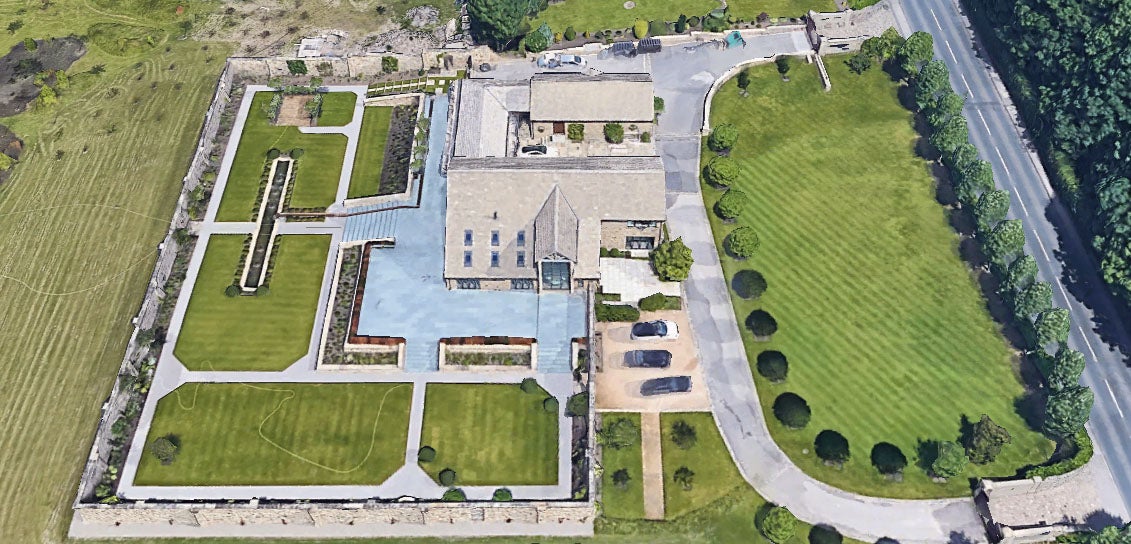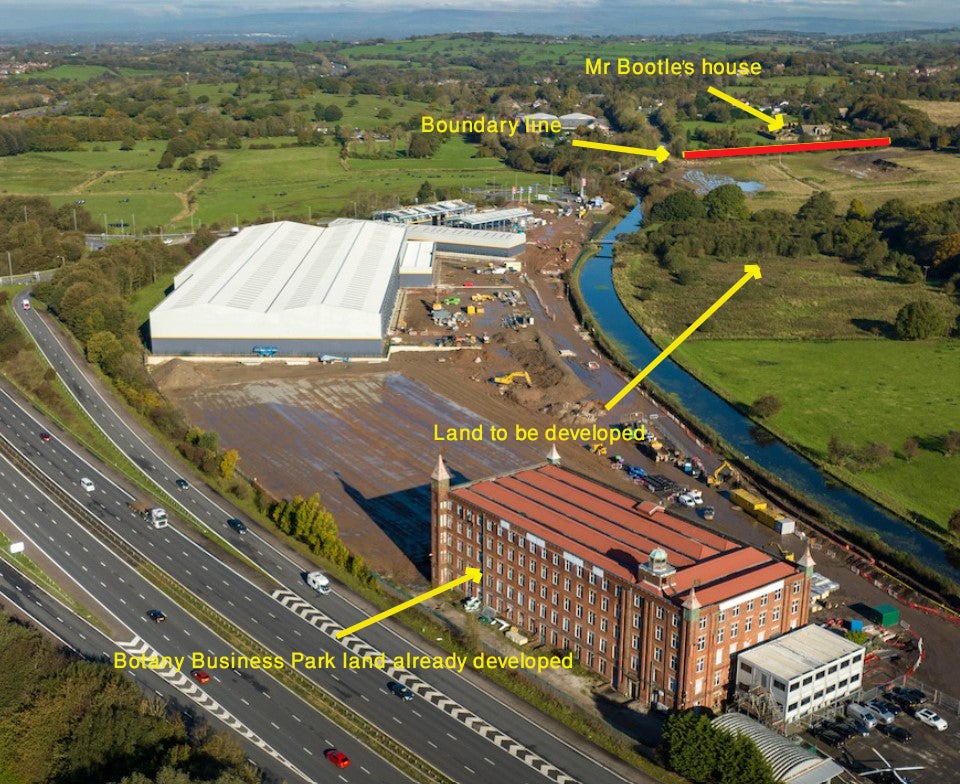Shorouk Express
A multi-millionaire businessman who came home from holiday to find developers had hacked down trees and hedges, leaving him staring at a busy A-road from his ten-acre country home, has won a High Court fight.
Auto repair king Lee Bootle said he was shocked to learn, via his housekeeper, that builders erecting a £100m business park next to his home had torn up hedges and trees along a 120m stretch of his land, ruining countryside views and leaving his home visible from the nearby A674.
Mr Bootle, 54, had bought a former farm, in Whittle-le-Woods, near Chorley, Lancashire, in 2007, before knocking the farmhouse down and building a high-end detached five-bed family home.
But work later began on the new Botany Business Park development on land next door, incorporating dozens of business units, as well as branches of Costa Coffee, Greggs and Co-op.
While he was on holiday, touring the Balearic islands on a yacht with his family, he received a phone call from his housekeeper informing him that greenery screening him from passing traffic and maintaining the family’s countryside view had been ripped out by workers making preparations for the business park.

open image in gallery
He went on to sue the developers, claiming damages for trespass in their hacking down of his trees and bushes along the boundary.
A judge has now ruled he is entitled to compensation, which his lawyers say should amount to hundreds of thousands of pounds.
The court heard Mr Bootle, who runs the multi-million pound James Group auto repair company, bought Little Knowley Farm, comprising a farm house with outbuildings and 10 acres of adjoining farmland, in 2007.
He then obtained planning permission, demolishing the existing house and building a five-bed family home, surrounded by landscaped walled gardens, for himself, his wife Rebecca and three children.

open image in gallery
The adjoining land was bought by developers GHL Property Management and Development Ltd in 2018.
After initially planning a 233-home site the company obtained permission for a £100m development for commercial, industrial, storage and distribution use, with FI Real Estate Management Ltd, doing the work.
The development land and Mr Bootle’s property were separated by a ditch and brook outside of the walls of his garden, with bushes, trees and fences on both sides of the watercourse.
“In anticipation of planning permission, GHL or its contractors commenced clearance work on 29 April 2024 or thereabouts,” the judge outlined in his judgment.
“This happened when Mr Bootle was away on business. However, on his return the following day, Mr Bootle advised workmen on site that they had cut down and removed trees on his land.
“He advised them that the boundary was the fence and hedge to the south of the brook, not the palisade fence on his land to the north.”
In his evidence, Mr Booth said that, after further trees were chopped down, he arranged a meeting with representatives of the developers who accepted that trees had been cut down and that no further work on his side of the boundary was necessary.
He then went off on holiday, touring the Balearic Islands by yacht with his family. But Mr Bootle’s housekeeper gave evidence to the court of her “disquiet” when she had to call him while he was away after realising more greenery had been ripped out and that the previously screened house was now visible from the busy A674 Millennium Way.
Although he did not award damages for the loss of privacy, Judge Mark Halliwell said the developers had committed “substantial acts of trespass,” which had resulted in “a substantial number of trees and bushes” removed from Mr Bootle’s side of the boundary.

open image in gallery
The judge said: “On 31 July, Ms Laura Francis, the Bootles’ housekeeper was disquieted to see that their house could now be viewed from Millennium Way.
“She contacted Mr and Mrs Bootle, who were on holiday abroad. They promptly asked her to take photographs and video film in relation to the progress of the works.”
The case went to court with Mr Bootle claiming in his evidence that the boundary between the two plots of land was the brook and ditch.
He claimed that, in doing work on the north side of the brook, the developers had strayed onto his land and hacked away mature trees belonging to him.
Giving judgment, Judge Halliwell found that the true boundary is to the north side of the brook and that the ditch and watercourse are on the developers’ land.
But in doing their work, they had repeatedly crossed over the boundary and onto Mr Bootle’s land, removing substantial amounts of bush and trees belonging to him, he found.
“The established boundary is north of the ditch and, from Mr Bootle’s perspective, it falls short of the position he has sought to advance in these proceedings,” he said.”To the extent that the defendants have carried out works flattening land to the south of the ditch, building an embankment and culverting parts of the ditch itself, they have not encroached on Little Knowley Farm.
“However, during the course of their works, the defendants have repeatedly entered Little Knowley Farm without Mr Bootle’s consent and committed acts of trespass on his property.
“This includes removing substantial amounts of the vegetation and cutting down bushes and trees north of the boundary. Such works commenced in late April 2024. There were further acts of trespass in June, July and August 2024.
“The defendants’ acts of trespass involved removing vegetation from Little Knowley Farm for the full length of the established boundary.
“It is likely to have included a substantial number of trees and bushes – significantly more than three trees – liberally spread north of the established boundary.
“Mr Bootle is prima facie entitled to damages for the recovery of his attendant losses and, in the absence of agreement, his losses will have to be assessed at a further hearing.”
Of Mr Bootle’s housekeeper’s account of the house now being visible from the nearby Millennium Way, the judge said he had visited the site and found the house was visible from the road.
Mr Bootle’s house had been built to take advantage of views to the south and west – in the direction of the A-road and the development land – and it had previously been screened by trees.
But the judge said damages could not be awarded for the loss of that screening.
“Mr Bootle’s cause of action is limited to acts of trespass on his land,” he said.
“Clearance works on neighbouring or adjoining land, including land screening Mr Bootle’s house from Millennium Way, is not actionable in itself.
“From Ms Francis’ evidence, it is not possible to show that Mr Bootle’s house ceased to be screened from the highway owing to acts of trespass on the part of the defendants.”
Earlier in the case, Mr Bootle had obtained an interim injunction stopping the developers working on land extending to a line just south of the ditch and brook, which at that point he was claiming was the boundary.
The judge said that, because he had found the boundary lay on Mr Bootle’s side of the brook, the developers had been temporarily stopped from working on land which they owned and would therefore be entitled to damages from Mr Bootle for the halting of work for about three weeks last summer
However, he also made a new injunction, banning the developers from trespassing over the now decided boundary onto Mr Bootle’s land in the future.
“Whilst I have determined that the established boundary is north of the ditch, the defendants have repeatedly trespassed north of the established boundary during the course of the development project and, in doing so, shown a casual disregard for the true line of the boundary,” he said.
“It can reasonably be surmised that they will continue to do so unless restrained by injunction.”
He is claiming damages running into several hundred thousand pounds, with the case set to return to court at a later date for a ruling on exactly how much he will receive.
However, he will also be liable to pay some compensation to the developers for about three weeks of lost work time on the development while the case was ongoing last year.
A further hearing will take place to decide the amounts in damages due, as well as who pays the substantial costs of the case.






















